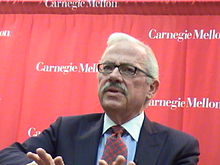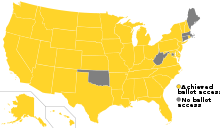Bob Barr 2008 presidential campaign
Reason magazine senior editor Radley Balko called Barr "the first serious candidate the LP has run since I've been eligible to vote.
Barr's efforts to be invited to presidential debates with the two main candidates also fell short when he failed to meet the 15% polling threshold.
[4] While in office, he was a strong proponent of the War on Drugs,[5] called for further investigations into the Waco Siege,[6] and authored the Defense of Marriage Act.
In 1998, he was a central figure in the Lewinsky scandal investigation, being the first congressman to call for President Bill Clinton's resignation after the allegations surfaced.
[7] Near the end of his time in Congress, Barr voted in favor of the USA PATRIOT Act[8] and the authorization for use of force against Iraq.
[14] Pollster John Zogby commented that a possible Barr candidacy would be potentially upsetting for Republicans, and described his possible supporters as individuals who saw him "as a consistent libertarian who opposed the PATRIOT Act, budget deficits and gun control.
[16] Leading up to Barr's announcement, columnist George Will wrote an article in Newsweek chronicling the Libertarian Party and the potential candidate's run.
He described the potential effect as a "condign punishment"[17] for presumptive Republican Party nominee John McCain for his co-sponsorship of the Bipartisan Campaign Reform Act of 2002, which Barr opposed.
He commented that his run would give the American people a "meaningful choice"[18] to vote for in November, preventing them from having to "hold their nose and pull a lever... for the lesser of two evils.
[18] In response to the announcement, Republican consultant Christopher Barron countered the claim of George Will on the campaign's potential "spoiler effect."
Baron stated that Barr's run "is unlikely to hurt Sen. McCain in any significant way"[19] but would aide the Republican Party "by siphoning off some of the enthusiasm among college voters and antiwar advocates for Obama.
"[20] Also during the interview, Barr articulated that his campaign would make use of the internet with methods similar to those employed by Ron Paul and Barack Obama to mobilize young voters.
"[24] May 18, 2008 Rasmussen polling reports showed Barr at 6% nationally in a four-way race with Barack Obama, John McCain, Ralph Nader.
[26] Barr participated in the Libertarian Party presidential debate, an event sponsored by Reason Magazine, on May 20, 2008, at Dupont Circle.
[31] Las Vegas businessman, and fellow Libertarian primary opponent Wayne Allyn Root, was named as his running mate.
Executive Vice President of the Cato Institute David Boaz commented that Barr had the best chance to be successful in the western states.
[35] Barr received some media exposure a few days after his nomination by visiting New York City to appear on both the Colbert Report and on Glenn Beck's Headline News program for an hour-long interview.
When confronted with opinion polls that showed the candidate with 3% in the presidential race, Barr explained that the numbers would increase in the following weeks, announcing that his campaign would be launched "full-time" on July 4.
[40] Barr launched his "full-time" campaign at Atlanta's Fourth of July parade, where the city celebrated the opening of the Millennium Gate arch.
[41] The next week, Barr appeared on Fox News, where he criticized the United States Treasury Department's plan to help Freddie Mac and Fannie Mae.
[44] In August, Barr spoke at the Minuteman Civil Defense Corps' protest during the Democratic National Convention in Denver.
[45] Barr presented a "common sense"[46] approach to the issue by promising to put an end to birthright citizenship and public education for illegal immigrants, while supporting an increase in green cards.
[47] As September began, commentator Greg Pierce of The Washington Times noted that the "grass-roots enthusiasm for [Barr's] candidacy seems to have faded a bit in the wake of individualist Governor Sarah Palin joining the Republican ticket.
[56] Paul had previously made favorable comments about Barr's campaign, leaving the candidate to feel that he alone should have received the endorsement.
The letter stated that Barr's current running mate, Wayne Allyn Root, would willingly step down should Paul accept the offer.
Barr's plea in West Virginia failed on September 7 after U.S. District Court Judge John T. Copenhaver Jr. dismissed the lawsuit.
The judge proclaimed that "it was their (the campaign's) lack of reasonable diligence that ultimately thwarted their effort to gain ballot access here" in West Virginia.
Commonwealth Court Judge Johnny Butler dismissed these allegations on September 16, allowing Barr to remain on the state's ballot.
Texas Secretary of State Esperanza Andrade reported that all the correct paperwork was filed, though neither the Democratic nor Republican parties formally nominated their candidates (at their respective conventions) until after the deadline.
He wrote that Barr did not win a significant percentage of the population because he was "not Libertarian enough,"[70] distanced himself too far from Ron Paul, and lacked adequate "communication and coordination.







